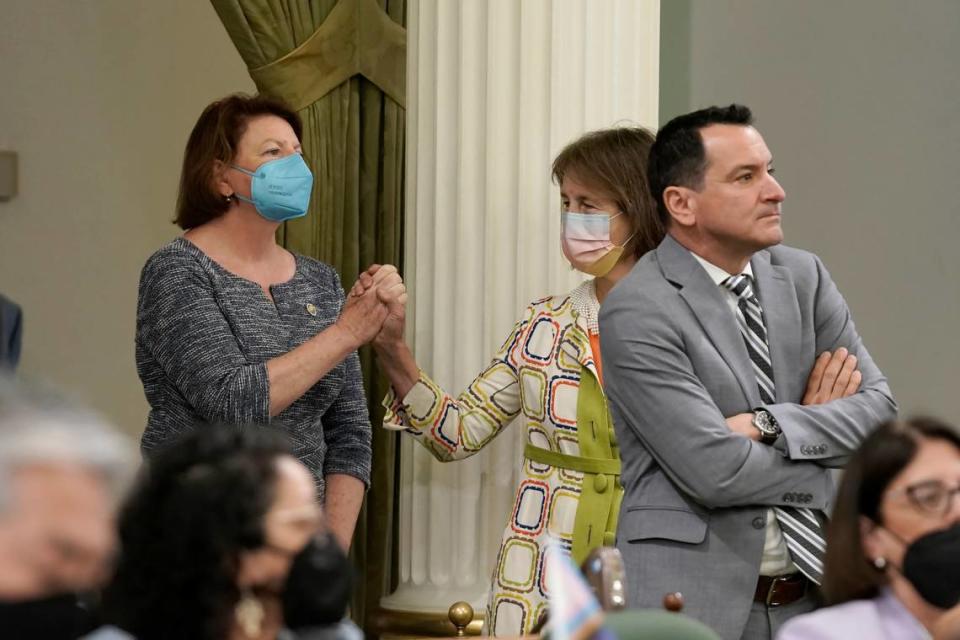California lawmakers approve abortion rights constitutional amendment — now it goes to voters
California voters in November will get the chance to vote on a state constitutional amendment guaranteeing residents the ability to seek abortions and use birth control.
The state Assembly on Monday voted 58-16 to approve Senate Constitutional Amendment 10, which would give Californians the “fundamental right to choose to have an abortion and their fundamental right to choose or refuse contraceptives.”
The Assembly approved the amendment just days after the U.S. Supreme Court issued a decision that overturned Roe v. Wade, the 1973 ruling that guaranteed federal abortion rights.
The justices’ decision on Dobbs v. Jackson Women’s Health Organization eliminated those rights at a national level, meaning states can now determine whether to allow or ban abortion care. Many states have already enacted pre-existing “trigger laws” that were set to ban abortions if the Supreme Court overturned Roe v. Wade.
On Monday, Assembly Speaker Anthony Rendon, D-Lakewood, urged members to enshrine abortion rights in the California constitution, a move lawmakers think is necessary to ensure future leaders and courts cannot easily throw them out.
“Colleagues, I stand here today and appeal to your reason, your compassion and your sense of justice,” Rendon said. “I stand here to ask that all Californians have the opportunity to vote on this critical right, and to vote it into our constitution and to show once again that we speak with an independent voice.”
The Senate approved the amendment on June 20. Both houses had to pass the bill by June 30 to make sure the measure appears on the November general election ballot.

Fast-tracked as Roe vs. Wade overturned
Senate President Pro Tem Toni Atkins, D-San Diego, Gov. Gavin Newsom and Rendon announced their intent to create the amendment in May, shortly after Politico published a leaked Supreme Court draft ruling suggesting the justices were preparing to overturn Roe v. Wade.
Several Assembly shared personal experiences that they said informed their views.
Assemblyman Jim Cooper, D-Elk Grove, shared that his daughter is about to give birth to his first grandchild. He said the event is a joyous one for his family but pointed out that Black pregnant people face a higher mortality rate than those of other races.
“I’m as happy as hell to be a grandpa,” Cooper said. “But at the same time, if my daughter’s life was on the line, if she had to make a hard decision, I would support her.”
Assemblyman Issac Bryan, D-Los Angeles, said his mother became pregnant with him after being raped, but she opted to give birth and place him up for adoption.
“I get asked all the time why that doesn’t make me pro-life,” Bryan said. “And it’s because my mother had options. She had choices, and they were hers to make. And I refuse to be tokenized to undermine the bodily autonomy of women and child-bearing people.”
Abortion experiences shape debate
Assemblywoman Buffy Wicks, D-Oakland, talked about having an abortion at age 25 and how important it was for her to be able to make that decision for herself.
“This needs to be enshrined in our constitution,” Wicks said. “Because I can assure you, the right wing agenda that is coming after this is coming after many things, as well.”
Republican Assembly Leader James Gallagher, R-Yuba City, said he couldn’t support the amendment because of its lack of provisions for fetal rights. Gallagher said his wife experienced complications while she was pregnant with their twin sons, who were born prematurely.
“They were alive and they are a person,” Gallagher said. “They’re people. And our law has to begin to recognize that. That’s why I can’t support this constitutional amendment today — because of what’s missing from it. It says nothing about their rights.”

 Yahoo Movies
Yahoo Movies 
